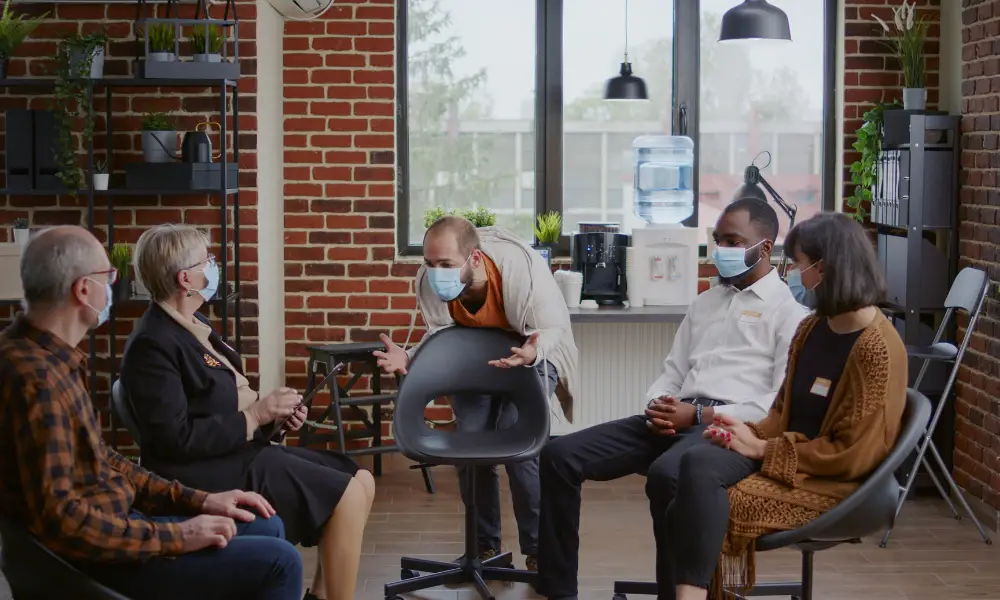Imagine being in the midst of a heated conversation and feeling a surge of anger bubbling within. It’s a sensation many can relate to, but not everyone knows how to navigate. Anger, while natural, can sometimes overwhelm, leaving us searching for tools to manage it effectively. If you’ve ever found yourself regretting words spoken in the heat of the moment or actions driven by uncontrolled rage, then you’re in the right place. This blog delves deep into the world of Group Therapy for Anger Management. Together, we’ll explore how this approach works, the unique benefits it offers, and ways to harness group dynamics for a more peaceful, balanced life. Dive in and discover a transformative journey towards mastering your emotions.
Contents
- 1 Understanding Anger: More Than Just an Emotion
- 2 Why Choose Group Therapy for Anger Management?
- 3 The Mechanics of Group Therapy for Anger
- 4 Techniques and Exercises Commonly Used
- 5 Overcoming Hesitations: Why You Shouldn’t Fear Group Therapy
- 6 Finding the Right Group: What to Look For
- 7 Finally, Is Group Therapy Good For Anger Management?
- 8 Conclusion
Understanding Anger: More Than Just an Emotion
 Anger is a powerful emotion, often manifesting as a fiery reaction to situations that seem unfair, hurtful, or threatening. But beneath this intense exterior, anger is often layered with deeper feelings and unresolved issues. Here’s a closer look:
Anger is a powerful emotion, often manifesting as a fiery reaction to situations that seem unfair, hurtful, or threatening. But beneath this intense exterior, anger is often layered with deeper feelings and unresolved issues. Here’s a closer look:
- Rooted in Past Experiences: For many, anger can stem from past traumas or unresolved conflicts, resurfacing when faced with similar situations in the present.
- Mask for Other Emotions: Anger can act as a protective shield, hiding feelings of vulnerability, fear, or sadness. It’s sometimes easier to express anger than to admit we’re hurt or scared.
- Triggered by External Factors: Everyday stressors, like traffic jams or work-related pressures, can accumulate and ignite anger, even if they aren’t the real cause of the emotional turmoil.
- Physical Responses: When anger surges, the body reacts. Heart rate accelerates, muscles tense up, and the mind becomes hyper-alert. This “fight or flight” response is a primal instinct, readying us to confront or escape a perceived threat.
Understanding the multifaceted nature of anger is crucial. It’s not merely an outburst but a complex interplay of past experiences, hidden emotions, and physiological reactions. Recognizing these nuances is the first step towards effective anger management.
Why Choose Group Therapy for Anger Management?
Group therapy has long been hailed as a potent tool for tackling a variety of emotional challenges, and anger management is no exception. When confronting anger, there’s profound power in collective healing. Here’s why:
- Shared Experiences: In a group setting, participants discover they aren’t alone in their struggles. Hearing others’ stories can be both comforting and enlightening, providing different perspectives on common challenges.
- Peer Feedback: Group members offer invaluable insights and feedback, helping each other identify triggers, misconceptions, and unhealthy patterns. This exchange of experiences often leads to breakthrough moments.
- Mutual Motivation: Witnessing someone else’s progress can be incredibly motivating. Group members often push each other forward, celebrating successes and providing support during setbacks.
- Safe Environment: A professionally moderated group provides a safe space to express emotions without judgment. This security fosters open communication and vulnerability, crucial for personal growth.
In essence, group therapy for anger management is more than just therapy; it’s a community of individuals united in their journey towards understanding and managing their anger more effectively.
The Mechanics of Group Therapy for Anger

Delving into group therapy for anger management means understanding its structure and processes. These sessions aren’t just about gathering and talking; they’re meticulously planned and executed for optimal results. Here’s a glimpse:
- Structured Sessions: A typical session begins with a check-in, where members share their experiences since the last meeting. This is followed by a main activity or discussion topic and concludes with a check-out or reflection time.
- Facilitated by Professionals: Experienced therapists or counselors lead the group, ensuring conversations remain productive and respectful. They introduce relevant topics, guide discussions, and intervene when necessary.
- Experiential Exercises: These might include role-playing scenarios, where members act out situations that trigger their anger. This hands-on approach provides insights into individual reactions and offers opportunities to practice new coping techniques in a controlled environment.
- Cognitive Behavioral Techniques: Group therapy often incorporates cognitive-behavioral strategies. These techniques help members identify negative thought patterns and replace them with healthier ones.
- Homework Assignments: Between sessions, members might receive assignments to encourage self-reflection or to practice techniques learned during sessions. This continuous engagement enhances the learning process.
- Confidentiality Agreement: Trust is crucial. Members commit to maintaining the confidentiality of shared stories and experiences, ensuring a safe space for everyone.
By understanding the mechanics, participants can have clear expectations and be more receptive to the transformative power of group therapy in managing anger.
Techniques and Exercises Commonly Used
 When it comes to anger management in a group setting, a blend of interactive exercises and proven strategies ensure participants harness their emotions effectively. Here’s a peek into some of the most favored techniques:
When it comes to anger management in a group setting, a blend of interactive exercises and proven strategies ensure participants harness their emotions effectively. Here’s a peek into some of the most favored techniques:
- Deep Breathing: This simple yet powerful technique requires members to take deep, controlled breaths when they feel anger bubbling up. It’s a way to momentarily step back from the situation, allowing for clearer thinking.
- Role-Playing: Members act out scenarios that typically trigger their anger. This gives them a chance to practice responding differently and to receive feedback from peers.
- The “Stop” Technique: When recognizing a trigger or the onset of anger, one mentally (or even verbally) says “stop” to disrupt the escalating emotion and regain control.
- Progressive Muscle Relaxation: By tensing and then relaxing different muscle groups, participants can physically release the tension that anger brings, promoting overall calmness.
- Journaling: Writing down feelings or triggers can offer clarity, serve as a form of release, and help in tracking progress.
- Guided Imagery: Participants are guided to visualize peaceful and calming scenarios, assisting them in anchoring to those feelings when faced with real-life anger triggers.
- Feedback Circle: A participant shares an incident that made them angry, while others provide feedback on alternative reactions or viewpoints. This widens perspectives and offers diverse coping mechanisms.
- Problem-Solving Sessions: As a group, they discuss real-life scenarios and brainstorm potential solutions. This collective approach often brings forth varied and creative ways to tackle anger-inducing situations.
- Communication Skills Training: Miscommunication can be a significant trigger. By learning active listening, effective questioning, and assertiveness (rather than aggression), participants can navigate conversations better.
Incorporating these techniques and exercises into group sessions not only equips members with tangible skills but also fosters a supportive environment where learning from peers becomes a valuable aspect of the healing journey.
Overcoming Hesitations: Why You Shouldn’t Fear Group Therapy
 Group therapy, though immensely beneficial, can sometimes seem daunting. Many harbor reservations, fearing judgment, exposure, or simply the unfamiliar. Let’s address some common hesitations:
Group therapy, though immensely beneficial, can sometimes seem daunting. Many harbor reservations, fearing judgment, exposure, or simply the unfamiliar. Let’s address some common hesitations:
- Fear of Judgment: It’s natural to fear being judged, especially when sharing personal experiences. But remember, every participant in group therapy is there for a similar reason. The environment is supportive and non-judgmental, with everyone working towards betterment.
- Concern Over Privacy: Confidentiality is a cornerstone of therapy. Participants are often reminded of the importance of respecting privacy, ensuring that what’s discussed in the group stays within its confines.
- Worries About Speaking Up: Not everyone is vocal, and that’s okay. Group therapy isn’t about pressuring anyone to share; it’s about providing a space where you can share if you choose to.
- Fear of Not Fitting In: Just like in the outside world, group therapy consists of diverse individuals. With time, participants often find common ground, and many even form profound connections with their peers.
- Doubts About Effectiveness: Some might wonder, “Will group therapy work for me?” It’s a valid concern. But group therapy offers something individual therapy might not – a chance to learn from peers, gain diverse perspectives, and garner mutual support.
- Worry of Overwhelm: Being in a room with multiple people sharing heavy emotions can seem overwhelming. However, skilled therapists guide sessions ensuring a balanced and safe environment for all.
If you’re considering group therapy, remember, the initial apprehension is normal. But with an open mind and heart, you might find it to be a transformative experience, providing insights and camaraderie that are hard to replicate elsewhere.
Finding the Right Group: What to Look For
 Choosing the right anger management group can be the key to a successful therapeutic journey. Here’s a guide to help you make an informed decision, and why TherapyMantra might be the right choice for you:
Choosing the right anger management group can be the key to a successful therapeutic journey. Here’s a guide to help you make an informed decision, and why TherapyMantra might be the right choice for you:
- Therapist’s Credentials: Ensure that the group is led by a licensed therapist with experience in anger management. At TherapyMantra, our professionals are thoroughly vetted, ensuring you receive guidance from the best in the field.
- Group Composition: Aim for a group that shares similar anger triggers or backgrounds, making discussions more relatable. TherapyMantra offers specialized groups, ensuring you find a cohort you’re comfortable with.
- Size of the Group: Smaller groups might offer more personal attention, while larger ones provide diverse perspectives. TherapyMantra caters to both preferences, allowing you to choose based on comfort.
- Feedback and Reviews: Look for testimonials or reviews from previous participants. TherapyMantra prides itself on its positive feedback, testament to our effective methodologies and supportive environment.
- Structure and Methodology: Whether you prefer a structured format with specific activities or a more open discussion depends on personal preference. TherapyMantra offers varied formats, catering to different therapeutic needs.
- Cost and Schedule: It’s essential to find a group that fits your budget and schedule. TherapyMantra offers flexible timings and competitive pricing, ensuring therapy is accessible for all.
- Comfort and Environment: Feeling safe and comfortable is crucial. With TherapyMantra, you can be assured of a welcoming environment where your well-being is the top priority.
When seeking an anger management group, it’s essential to do thorough research and trust your instincts. And with platforms like TherapyMantra, you’re not just finding a group; you’re finding a community dedicated to your growth and healing.
Finally, Is Group Therapy Good For Anger Management?
Absolutely! Group therapy provides a unique platform for those dealing with anger to share experiences, learn from peers, and gain new strategies to cope. In a group setting, participants often find validation in knowing they’re not alone in their struggles. This collective environment fosters mutual motivation, accountability, and an array of perspectives that can illuminate the path to managing anger more effectively. In essence, group therapy offers a synergistic blend of professional guidance and peer support, making it a powerful tool in the journey towards mastering one’s anger.
Conclusion
Navigating the tumultuous waters of anger can be challenging, but you don’t have to do it alone. Group therapy offers a supportive environment to learn, share, and grow, equipping you with the tools needed to manage anger constructively. Remember, seeking help is a sign of strength, not weakness. If you are experiencing anger-related issues, Online Anger Counseling at TherapyMantra can be your guiding light. Don’t wait; take a proactive step towards a calmer, more controlled you. Book a trial Online therapy session today and embark on a transformative journey.


